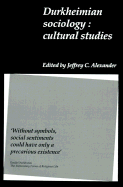Book contents
- Frontmatter
- Contents
- List of contributors
- Acknowledgements
- Introduction: Durkheimian sociology and cultural studies today
- Social change and sacralization
- Micro and macro in symbolic context
- 4 Religious elements in friendship: Durkheimian theory in an empirical context
- 5 The Durkheimian tradition in conflict sociology
- 6 Social structure and civil religion: legitimation crisis in a late Durkheimian perspective
- Ritualization and public life
- Index
6 - Social structure and civil religion: legitimation crisis in a late Durkheimian perspective
Published online by Cambridge University Press: 05 July 2011
- Frontmatter
- Contents
- List of contributors
- Acknowledgements
- Introduction: Durkheimian sociology and cultural studies today
- Social change and sacralization
- Micro and macro in symbolic context
- 4 Religious elements in friendship: Durkheimian theory in an empirical context
- 5 The Durkheimian tradition in conflict sociology
- 6 Social structure and civil religion: legitimation crisis in a late Durkheimian perspective
- Ritualization and public life
- Index
Summary
Introduction
In the last decade there has been an intense debate on legitimation problems in democratic–industrial societies. The discussion of a crisis of legitimacy referred to a societal configuration which, to a greater or lesser degree, had emerged in the industrial part of the Western hemisphere in the last thirty years: a powerful and dynamic capitalist economy, technologically innovative, concentrated in big corporate units and producing for the world market; an interventionist state which in marked contrast to the classical liberal state is engaged in scientific, technological and economic affairs in multiple ways and contributes considerably to a smooth operation of economic activities; welfare-state agencies which distribute life chances to a considerable degree by economic transfers, social security programs, and infrastructural policies. This new configuration is closely associated with the rise of new values and aspirations in contemporary societies which refer not only to the economic standard of living and material well-being but to the quality of life and cultural wellbeing. These new needs and expectations entail diverse aspects like good health care, educational attainment, political participation and communication as well as the enactment of new and often unconventional lifestyles.
However varied this process of social change may have been in different nations and regions, the resulting configuration has one common feature: the state has gained the central part in contemporary society, and the liberal separation of economy, state and society has been replaced by a complex intermediation of economic, political, and social life.
- Type
- Chapter
- Information
- Durkheimian SociologyCultural Studies, pp. 129 - 158Publisher: Cambridge University PressPrint publication year: 1988
- 12
- Cited by



